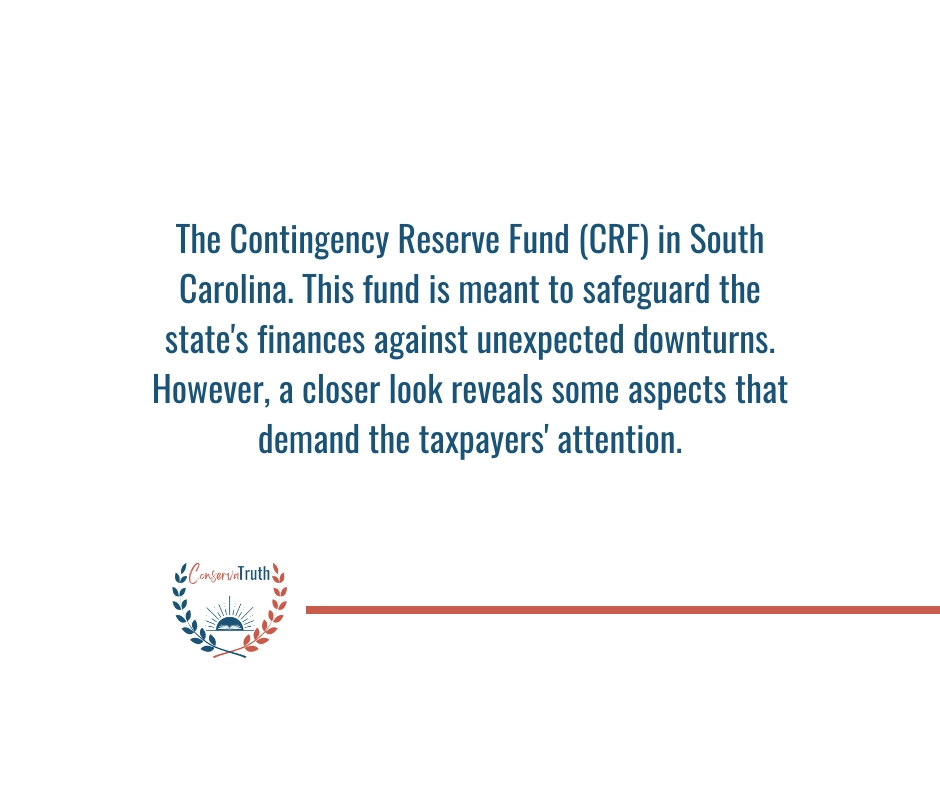Picture your savings account - where you stash away funds for a rainy day, ensuring a cushion against unforeseen adversities. Now, transpose this individual financial prudence to a state level, and you have what's known as the Contingency Reserve Fund (CRF) in South Carolina. This fund is meant to safeguard the state's finances against unexpected downturns. However, a closer look reveals some aspects that demand the taxpayers' attention.
The CRF, outlined in SC Section 11-11-220, is essentially the state’s PIGGY BANK for unexpected financial needs. However the establishment and administration of this fund are not as simple as one might expect. The money in the CRF is surplus from the state’s general fund, a significant portion of which comes from taxpayers. The process to determine the amount to be deposited in the CRF is initiated by the Comptroller General, who then notifies the Board of Economic Advisors.
The General Assembly has a say over how the money in the CRF is appropriated. A glaring example is the 2023 Joint Resolution A3, R6, H3604, which allocated a significant portion of the CRF towards Project Connect, a project spearheaded by Scout Motors. The project aimed to foster economic development through infrastructure and other sectoral improvements. While economic development is commendable, the deviation from the CRF's primary purpose as a financial safety net raises questions.
The transaction with Scout Motors was negotiated by the state’s Department of Commerce (the “DOC”). As FitsNews points out, the details of this agreement have not been made public, citing confidentiality, a usual practice by the DOC. This bill was rapidly passed through the House and Senate, with little to no floor debate, a maneuver that raises eyebrows on the transparency and accountability of the process.
The bill, as outlined in H3604, allocated $1.091 billion for various infrastructure projects under Project Connect, covering a spectrum of development needs from bridge construction to soil stabilization. However, the expedited legislative process and the allocation of such a significant amount from the CRF seems to diverge from the fund's original 'emergency-only' intent.
Furthermore, a Palmetto State Watch article highlights how this bill facilitated Scout Motors, a startup aligned with Volkswagen, with $1.3 billion in state incentives and $400 million in taxpayer dollars to set up shop in Blythewood, South Carolina. This allocation from the CRF is a deviation that should prompt taxpayers to question the management and allocation of the fund.
Unlike other funds, the CRF doesn't have a mention in the South Carolina Constitution, operating in a legal gray area that might be a red flag for those advocating for transparent governance.
The absence of the CRF in the South Carolina Constitution leaves a gap in the formal oversight and structured management of this crucial fund. Without constitutional backing, the rules governing the CRF’s utilization and replenishment remain susceptible to legislative adjustments, which may not always align with the fund's initial objective of financial stabilization. This fluidity in governance can potentially obscure the clear delineation of the fund's purpose, making it a vessel for projects that may not align with the fiscal conservatism valued by many South Carolinians. Therefore, it's imperative that there's a collective call for more structured guidelines and perhaps constitutional recognition to ensure that the CRF remains a reliable financial safety net, managed with utmost transparency and accountability. A clear legal framework will strengthen the CRF against misuse and increase public trust in how the state uses and distributes these reserve funds.
In conclusion, the Contingency Reserve Fund is not just a state-level savings account but a reflection of fiscal management and accountability in South Carolina. The CRF, funded by the taxpayers, demands a higher degree of scrutiny, transparency, and accountability, ensuring that every dollar is spent judiciously and in line with the state’s financial safeguarding principles. So, when discussions around the CRF or similar fiscal matters crop up, it’s crucial for the taxpayers to tune in, ask questions, and demand accountability. After all, it's not just about financial security, but also about fostering a culture of transparent and accountable governance.
Resources:
Contingency Reserve Fund (CRF): A fund set aside by the state of South Carolina to manage unexpected financial needs.
SC Section 11-11-220 (official legislation)
Comptroller General: An official in South Carolina responsible for overseeing state's financial transactions.
Board of Economic Advisors: A board that provides economic forecasts and estimates for the state.
General Assembly: The legislature of South Carolina, consisting of two chambers: the House of Representatives and the Senate.
Joint Resolution A3, R6, H3604: A resolution passed in 2023 concerning the appropriation of funds from the CRF for economic development purposes.
FitsNews: A news outlet providing articles on various topics including state financial dealings.
Palmetto State Watch: Another news outlet with articles on state politics and financial matters.
Subscribe to ConservaTruth's Email Newsletter for curated insights on South Carolina's legislative activities and conservative viewpoints, delivered straight to your inbox! With vetted and easy-to-understand information, our newsletter empowers you to become an informed and engaged citizen, actively participating in safeguarding our cherished Constitutional values. Don’t miss out on crucial updates—join our community of informed conservatives today!





Comments